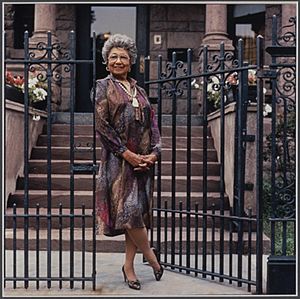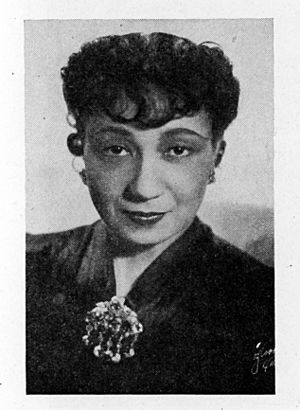Etta Moten Barnett facts for kids
Quick facts for kids
Etta Moten Barnett
|
|
|---|---|
 |
|
| Born | November 5, 1901 Weimar, Texas, U.S.
|
| Died | January 2, 2004 (aged 102) |
| Occupation | Actress, singer, U.S. cultural representative in Africa |
| Years active | 1929–1952 |
| Spouse(s) | Curtis Brooks (m. c. 1918; div. 1924) |
| Children | 3 |
Etta Moten Barnett (born November 5, 1901 – died January 2, 2004) was an American actress and singer. She was famous for her role as "Bess" in the opera Porgy and Bess. Etta helped create new and important roles for African-American women in movies and on stage.
After she stopped performing, Etta became a major helper in Chicago. She raised money and supported many cultural, social, and church groups. She also had her own radio show in Chicago. The United States government even sent her to African countries as a cultural representative.
Contents
Etta Moten Barnett's Life Story
Growing Up and Education
Etta Moten was born in Weimar, Texas. She was the only child of Rev. Freeman F. Moten, a Methodist minister, and Ida Norman Moten, a teacher. Etta started singing in her church choir when she was a child.
Her parents believed education was very important. They made sure Etta went to good schools no matter where they lived. Etta attended Paul Quinn College's high school in Waco, Texas. Then, she went to Western University (Kansas), a historically black college (HBCU) in Quindaro, Kansas. There, she studied music. To pay for her classes, she sang on the radio and performed with singing groups. She finished her studies at the University of Kansas in 1931. She earned a degree in voice and drama. Etta was the first student to perform a recital in the school's new Hoch Auditorium. She also joined the Alpha Kappa Alpha sorority, which helped her throughout her career.
Her Amazing Career
Etta Moten Barnett's first job was teaching at Lincoln University. But her father told her they were moving to New York. In New York City, Etta first sang as a solo artist with the Eva Jessye Choir. Eva Jessye was a famous musician who worked with Virgil Thomson and George Gershwin. In 1931, Etta performed in a musical show called Fast and Furious. She also acted in the Broadway show Zombie.
Etta appeared in two musical movies in 1933. In Flying Down to Rio, she sang "The Carioca". She had a bigger role in the musical Gold Diggers of 1933, where she sang "My Forgotten Man." Also in 1933, she sang for actress Theresa Harris in the movie Professional Sweetheart. Before Etta, black women in movies often played maids or nannies. Etta helped change this by getting more important roles. She is known as one of the first black women to do this.
On January 31, 1934, Etta Moten became the first African American to perform at the White House in the 20th century. This was the first time in over 50 years! She sang "The Forgotten Man" from her movie Gold Diggers of 1933 for President Franklin D. Roosevelt's birthday. The song reminded people of Roosevelt's promise to help the "forgotten man."
Etta Moten Barnett broke barriers in music and acting. She faced unfair treatment because of her race. But she kept going, believing she had to be "twice as good to get anywhere at all."
George Gershwin, a famous composer, wanted Etta to sing the part of "Bess" in his new opera, Porgy and Bess. He had written the role with her in mind. Etta worried the part was too high for her voice. But in the 1942 revival of the show, the part of Bess was changed. Etta performed as Bess on Broadway and in touring shows until 1945. This role became her most famous.
She stopped performing in 1952 because of problems with her voice. Doctors found a cyst on her vocal cords that needed surgery. After her husband, Claude Barnett, passed away in 1967, Etta lived in Chicago. She became very active in many groups. These included the National Council of Negro Women, the Chicago Lyric Opera, and the Field Museum. She also helped the DuSable Museum and the South Side Community Art Center.
Etta Moten Barnett was also a board member for The Links, a service group for African-American women. She was also active in her sorority, Alpha Kappa Alpha. She took part in International Women's Year events in the 1980s.
Cultural Missions and Radio Show
In the 1950s and 1960s, Etta Moten Barnett hosted a radio show in Chicago called I Remember When. Many recordings of her show are kept at the Library of Congress. Historian Angela Tate said Etta's program was likely the first radio show by a black woman made for black listeners that also reached a wider audience.
The United States government chose Etta to represent them on cultural trips to ten African countries. Her marriage to Claude Barnett also gave her chances to travel to Africa. Claude was the head of the Associated Negro Press. He, Etta, and others often visited Africa to gather news for their newspaper. On March 6, 1957, Etta interviewed Dr. Martin Luther King Jr. in Accra, Ghana. They were both there for Ghana's independence celebration from Great Britain. Etta was with her husband, who was part of the official U.S. group. Dr. King was there because he cared about freedom for all people. Etta recorded their talk in a Ghanaian radio studio for her Chicago show. This recording is also at the Library of Congress.
Etta's Family Life
Around 1918, Etta married Curtis Brooks, who had been her high school teacher. They had three daughters: Sue, Gladys, and Etta Vee. They divorced after six years.
In 1934, while working in New York, Etta married Claude Albert Barnett. He was the head of the Associated Negro Press in Chicago. They were happily married for 33 years until he passed away in 1967.
Etta Moten Barnett died from pancreatic cancer in Chicago in 2004. She was 102 years old.
Awards and Honors
- 1943 – University of Kansas, award for merit
- 1958 – National Association of Business and Professional Women, award for service
- 1973 – African Center of Atlanta University, award for her help with Afro-American music
- 1974 – WAIT, award for her help in Chicago
- 1979 – Joined the Black Filmmakers Hall of Fame as an actress and concert artist
- 1983 – Candace Award from the National Coalition of 100 Black Women
- 1988 – African American Institute award for service to Africa
- 1993 – Order of Lincoln from the State of Illinois
- 2001 – Joined the Emily Taylor Center for Women and Gender Equity, University of Kansas
- 1976 – Atlanta University
- 1983 – Spelman College
- 1987 – University of Illinois
- 1989 – Lincoln University (Pennsylvania)
- 1989 – North Carolina Central University
Her Work
Stage Performances
- Fast and Furious, a musical show (1931)
- Zombie, a play (1932)
- Porgy and Bess, a musical revival (1943)
- Lysistrata, a comedy by Aristophanes, with an all-black cast (1946)
Movies She Was In
- Ladies They Talk About (1933) as Singing Inmate (voice, not credited)
- Gold Diggers of 1933 (1933) as 'Remember My Forgotten Man' Singer (not credited)
- Bombshell (1933) as Singer (scenes removed)
- Flying Down to Rio (1933) as The Colored Singer
- Professional Sweetheart (1933) (sang for Theresa Harris)
- Operator 13 (1934) as Slave at Medicine Show (not credited)
- The Green Pastures (1936) as Angel (not credited)
- A Day at the Races (1937) as Black Singer (not credited)
- Born to Sing (1942) as Soloist – 'Ballad for Americans' (not credited) (her last movie role)
See also
 In Spanish: Etta Moten para niños
In Spanish: Etta Moten para niños
 | Toni Morrison |
 | Barack Obama |
 | Martin Luther King Jr. |
 | Ralph Bunche |


